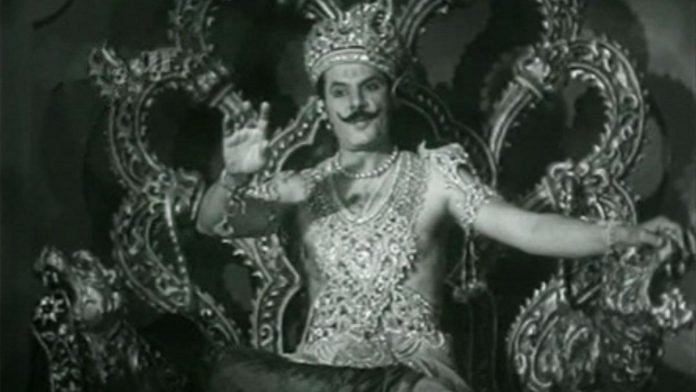Sohrab Modi’s films were larger than life. The thespian, actor and director was one of the early legends of the Indian film industry, celebrated and remembered for his epic historical productions.
A recipient of the prestigious Dadasaheb Phalke Award (1980), he drew from Shakespeare and his experience with Parsi theatre to entertain and inform the audience.
But it was his extravagant, big-budget films with opulent sets that earned him international recognition.
Humble beginnings
Sohrab Modi’s 1935 iteration of Shakespeare’s Hamlet, Khoon ka Khoon, was the first Hindi/Urdu sound film adaptation of the famous tragedy. Modi’s 1941 epic film, Sikander, starring Prithviraj Kapoor, came out when Indian soldiers were fighting WWII under British rule. It pulled at the heartstrings of a nation fighting for independence.
With emotions running high, and the call for freedom growing louder and louder, the film was banned from some theatres in Army cantonments despite being approved by the Bombay censor board.
And in the era of big-budget films like Baahubali and Ponniyin Selvan, his 1953 epic, Jhansi ki Rani remains one of the Indian film industry’s more expensive films. The first technicolour film to be made in India, it had a budget of Rs 60 lakh, a huge cast, and a crew from Hollywood. His wife Mehtab starred as Jhansi ki Rani, while Modi played the role of her royal advisor. The film took nearly 11 years to make—he had wanted to make the film since 1942.
“In those days, it cost something like a crore,” Mehelli Modi, Sohrab’s son, told Scroll in an interview.
It received critical praise, but such an expense meant commercial failure at the box office.
Modi bounced back the following year with Mirza Ghalib (1954), which received both the President’s gold medal for All-India Best Feature Film and the President’s silver medal for the Best Feature Film in Hindi.
At a special screening, then Prime Minister Jawaharlal Nehru told legendary actor and singer Suraiya, who played Ghalib’s lover, “You have brought Ghalib’s soul back to life.”
Also read: Imtiaz Ali Taj gave Urdu literature Anarkali, Chacha Chakkan. But the world forgot him
Keeping up with change
Sohrab Modi was born on 2 November 1897 in Bombay (now Mumbai). He developed an interest in films with his brother Keki Modi, who owned the Kismet Cinema, a travelling cinema projection business.
These years heavily influenced his creativity and cemented his love for the movies. He founded the Arya Subodh Natak Mandali in Gwalior, Madhya Pradesh, in 1923, which specialised in adapting William Shakespeare’s plays in Urdu.
He began his acting career with Parsi theatre. But by the 1930s, silent films gave way to ‘the talkies’, with Ardeshir Irani’s 1931 film, Alam Ara, leading the way. The popularity of plays, too, started to wane as everyone wanted to experience watching a film with sound.
Modi realised that films were the way to go. Many Parsi theatre troupes transformed themselves into film companies. Sohrab and his brother formed the Stage Film Company, hoping to adapt William Shakespeare’s plays to the big screen.
They produced Khoon Ka Khoon (1935) and Said-e-Havas (1936) based on Hamlet and King John, respectively. Both films failed at the box office, but Sohrab used the experience to understand all that made filmmaking different from theatre.
He said that a director’s skill lay in their ability to translate a script both visually and aurally.
Also read: Raaj Kumar—Bollywood prince left the police force to live a king-sized life in his white shoes
The king of epics
In 1936, one year after he started Stage Film Company, Sohrab launched Minerva Movietone, a film studio that set itself apart by creating extravagant and expensive historical dramas—in scale and technique.
His early films at Minerva dealt with contemporary social issues in India. Hindu women’s right to divorce was portrayed beautifully in Talaq (1938), while Meetha Zahar (1938) addressed alcoholism.
But Minerva achieved fame with three films based on key historical events—Pukaar (1939), Sikandar (1941), and Prithvi Vallabh (1943). Interestingly, Pukaar featured real courts and palaces from the Mughal era, which helped Sohrab maintain the script’s authenticity.
Also read: Her lips painted red, ghazal queen Begum Akhtar sang with a ‘pain in her voice’
A performer till the end
He married actor Mehtab (born Najma Khan) on the sets of Parakh (1944) against his family’s wishes. He was 16 years older than her, and she was a Muslim who had a son from her previous marriage to co-actor Ashraf Khan.
Meena Kumari ki Amar Kahani (1981) was the last film he directed, but he continued to act. He played the role of ‘wazir-e-Azam’ or the queen’s prime minister in Kamal Amrohi’s Razia Sultan (1983).
Sohrab Modi’s last years were quite tragic as he lost large sums of money to opportunists, who took advantage of his passion for filmmaking through fraud and advance payments. Subsequently, Modi fell sick and never recovered, succumbing to cancer of the bone marrow in 1984 at the age of 86. Pieces of his legacy, such as the Phalke medallion, ended up in Mumbai’s Chor Bazar, only to be unearthed in 2006.
(Edited by Zoya Bhatti)



